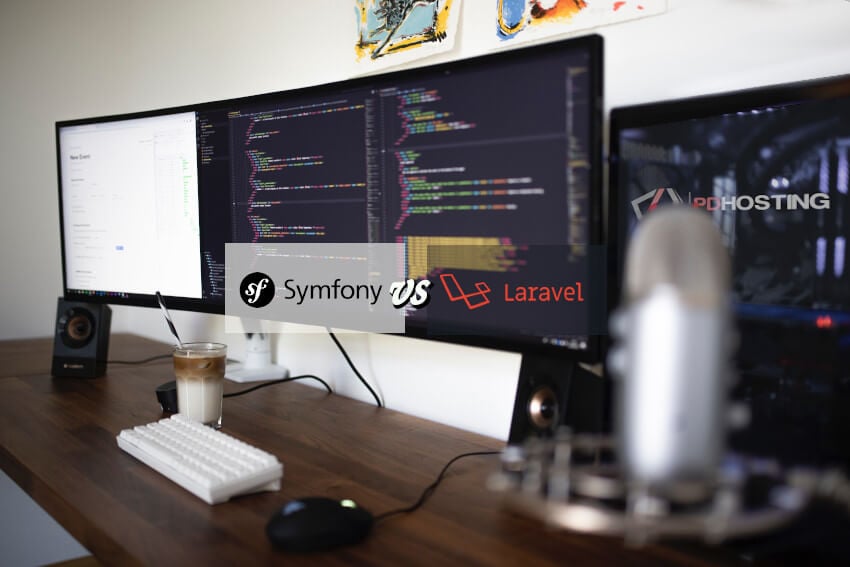
Comparing the Symfony and Laravel PHP Frameworks (Symfony vs Laravel)
As a web developer, you have a wide range of PHP frameworks to choose from when building web applications and APIs. Two of the most popular options are Symfony and Laravel.
In this post, we’ll compare Symfony and Laravel to help you decide which one is right for your project.
What is Symfony?
Symfony is a set of reusable PHP components and a PHP framework for web projects. It provides a standard foundation on which to build your application, and includes tools and libraries for tasks such as routing, authentication, and form creation.
One of the key benefits of using a framework like Symfony is that it provides a set of best practices and conventions that can help you build more scalable and maintainable web applications. It also has a large developer community, which means you can find support and resources online when you need it.
More details about Symfony Framework can be found at this article: An Introduction to the Symfony PHP Framework
What is Laravel?
Laravel is a PHP framework for web projects. It provides a standard foundation on which to build your application, and includes tools and libraries for tasks such as routing, authentication, and form creation.
One of the things that sets Laravel apart from other PHP frameworks is its elegant syntax. It makes use of PHP’s modern features to provide a clean and expressive codebase. Laravel also includes a templating engine called Blade, which allows you to easily create dynamic views for your web application.
Another thing that sets Laravel apart is its extensive documentation. Laravel’s documentation is comprehensive and easy to follow, making it a great resource for new developers learning the framework.
More details about Laravel Framework can be found at this article: An Introduction to the laravel PHP Framework
Comparing Symfony and Laravel
Symfony and Laravel are two popular PHP frameworks for building web applications. Both frameworks offer a range of tools and features that make it easy to develop web applications quickly and efficiently. We’ll take a look at the key differences between Symfony and Laravel to help you decide which one is the best fit for your project.
Architecture
One of the main differences between Symfony and Laravel is their architecture. Symfony is a full-stack framework, meaning it provides a complete set of tools and components for building web applications. Laravel, on the other hand, is a modular framework, meaning it is built on top of a set of separate components called packages. This means that Laravel is more flexible and customizable, as you can choose which packages to include in your application.
Performance
Another key difference between Symfony and Laravel is their performance. Symfony is known for being a fast and efficient framework, thanks to its use of compiled PHP bytecode and a built-in cache system. Laravel also has good performance, but it may not be as fast as Symfony in certain scenarios.
Community and documentation
Both Symfony and Laravel have large and active communities, with a wealth of resources and documentation available online. However, Symfony has a longer history and a larger user base, which means it may have more extensive documentation and a larger pool of developers to draw from.
Ecosystem
Finally, Symfony and Laravel have different ecosystems of tools and resources available to them. Symfony has a wide range of reusable components and libraries that can be used in any PHP project, not just Symfony applications. Laravel, on the other hand, has a large ecosystem of packages and tools that are specifically designed for use with the framework.
Now that we’ve introduced Symfony and Laravel, let’s compare them.
Syntax
Symfony uses traditional PHP syntax, while Laravel uses more modern, expressive syntax. This can make Laravel more approachable for newer developers, but experienced developers may prefer the more familiar syntax of Symfony.
Symfony
<?php
use Symfony\Component\Routing\Annotation\Route;
class BlogController
{
/**
* @Route("/blog/{slug}", name="blog_show")
*/
public function show($slug)
{
// ...
}
}Laravel
<?php
use Illuminate\Support\Facades\Route;
Route::get('/blog/{slug}', 'BlogController@show')→name('blog_show');As you can see, Laravel’s syntax is more concise and easier to read. This can make Laravel more approachable for newer developers, but experienced developers may prefer the more familiar syntax of Symfony.
Components
Symfony is known for its reusable components, which are standalone PHP libraries that can be used in any PHP project. Laravel does not have a similar system of components, but it does include a number of built-in libraries and tools.
Documentation
Both Symfony and Laravel have extensive documentation, but Laravel’s documentation is generally considered to be more beginner-friendly.
Community
Both Symfony and Laravel have large developer communities, but Laravel’s community is generally considered to be more active and welcoming to new developers.
Conclusion
In summary, Symfony and Laravel are both powerful and popular PHP frameworks that can help you build scalable and maintainable web applications. Whether you choose Symfony or Laravel will depend on your personal preferences and the needs of your project.
In conclusion, both Symfony and Laravel are powerful and popular frameworks for building web applications. The best choice for your project will depend on your specific needs and requirements. If you need a full-stack framework with good performance and a large user base, Symfony may be the better choice. If you want a more flexible and customizable framework with a large ecosystem of packages and tools, Laravel may be the better option.
